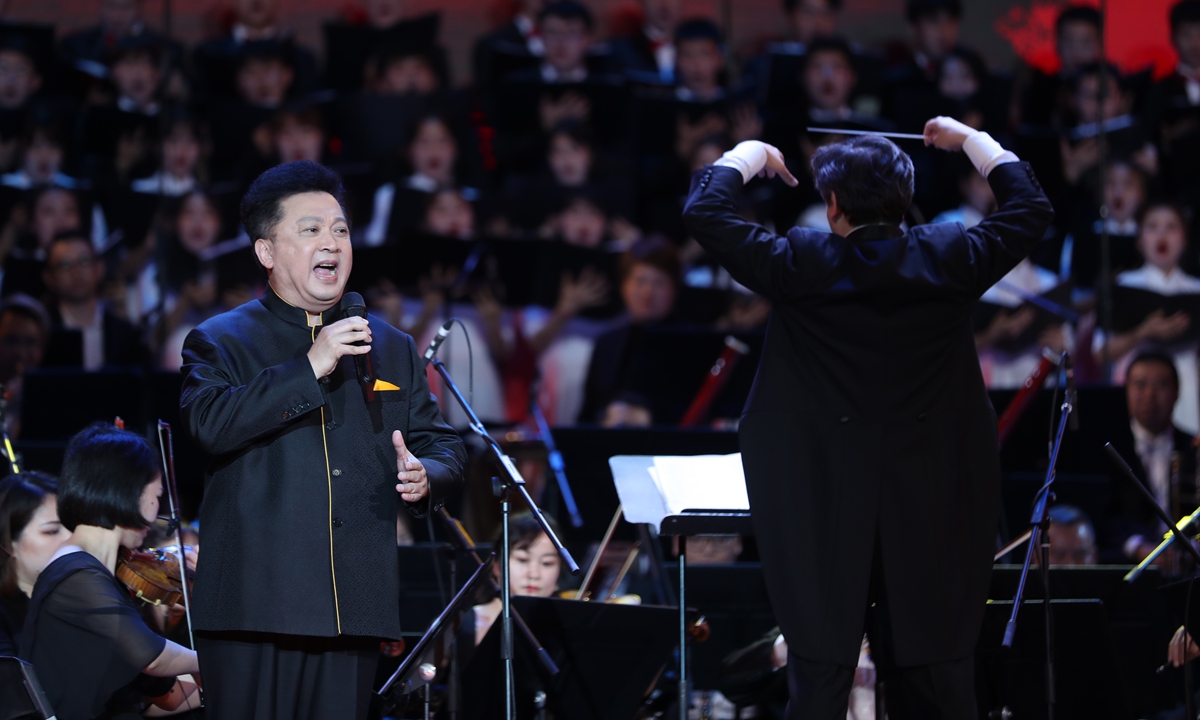
Yu Junjian, president of the College of Chinese and ASEAN Arts, sings in a music concert. Photo: VCG
The College of Chinese and ASEAN Arts will hold a folk music concert next week to celebrate its five-year establishment, aiming at promoting folk music to the world while strengthening cultural ties through the exchanges of music between China and Southeast Asian countries.
The Carry Forward the Traditional Beauty and Sing in the New Era concert is going to be held from May 26 to 28 in Beijing.
The performers of the concert, including cantatas and solos, will depict stories across China with different styles of folk songs such as those from Southwest and East China's Sichuan and Shandong provinces as well as the folk music of Northeast China. Students from ASEAN (Association of Southeast Asian Nations) countries will also give music performances such as folk songs from Indonesia, Thailand and Vietnam.
The event, planned by Yu Junjian, president of the College of Chinese and ASEAN Arts, "will feature Chinese folk music performances, and at the same time invite folk music performers from different countries here," Yu told the Global Times in an interview on Sunday.
"The event bears the responsibility of bringing forward the essence of everything Chinese," Yu said.
"The promotion of Chinese folk songs is also closely related to China's cultural cooperation with ASEAN.
"The status of language and music in ASEAN countries is very similar to ours, and I hope that deeper cultural exchanges will be achieved through this cooperation."
Music and art communication are important aspects of cultural exchanges and mutual understanding between China and ASEAN countries.
In recent years, there have been many initiatives and events to promote music and art communication under the framework of the China-proposed Belt and Road Initiative and China-ASEAN strategic partnership. The college is a pioneer and leader in fostering art communication and cooperation between China and ASEAN countries.
In recent years, there have been many initiatives and events to promote music and art communication under the framework of the China-proposed Belt and Road Initiative and China-ASEAN strategic partnership. Examples include the China-ASEAN Cultural Year 2020, aimed at deepening cultural exchanges and cooperation between China and ASEAN countries through online and offline activities; the China-ASEAN Music Week, held annually since 2015 showcasing diverse musical genres and styles from China and ASEAN countries; and the establishment of the College of Chinese and ASEAN Arts, a pioneer and leader in fostering art communication and cooperation between China and ASEAN countries.
Founded in 2017, the college is located in Chengdu, Sichuan Province, a city known for its rich and diverse cultural heritage. Supported by the Chengdu municipal government, the college focuses on educational and cultural exchanges between China and ASEAN countries though music, dances, designs, films and television and other forms of art.
It has held a series of activities such as the China-ASEAN Art Festival, the China-ASEAN Art Education Forum and the China-ASEAN Art Exhibition.
"The singing style of the older generation of folk singers who led the fashion of the time and created a unique style has been marginalized," Yu referred to the traditional Chinese music.
"If something is not done, the essence of China's unique emotion and regional styles attached to this type of singing will also disappear."
In order to promote traditional music, especially singing, Yu has organized tenor folk concerts on numerous occasions since 2018.
In early April, the folk tenor concert was held again in Shanghai as a special part of the 38th Shanghai Spring International Music Festival. Yu noted that these efforts should be made to make China's unique folk singing heard and seen by more people. "All of these are made to boost China's cultural confidence with its own characteristics."




